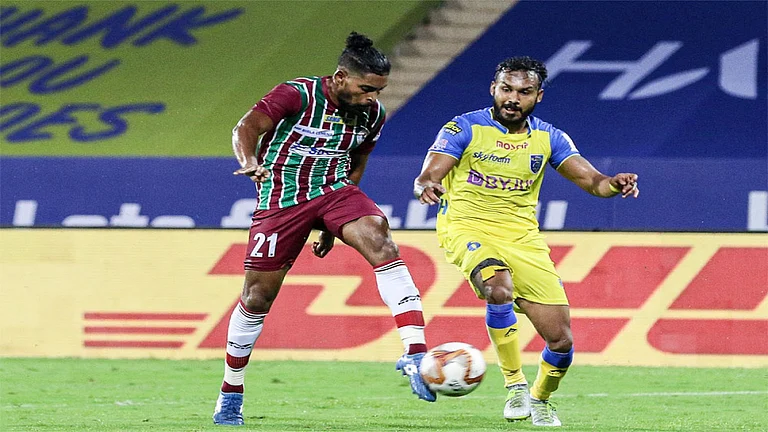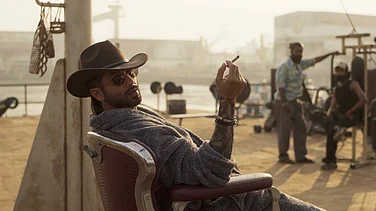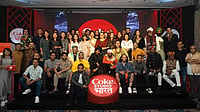'Class' on Netflix is the Indian adaptation of the hit Spanish series Elite. Set in a fictional elite high school named Hampton International, the story centers around the mystery surrounding the death of Suhani Ahuja ( played by Anjali Sivaraman), the daughter of a wealthy real estate magnate. The Netflix show directed by Ashim Ahluwalia focuses on the money, privileges, and class divide captured beautifully after three underprivileged kids receive a scholarship into a high society school. One could see how conflict, sex, teenage angst, betrayal, and rebellion are the strongest emotions in the show played by a very young star cast.
In this conversation with the director, we speak about how he kept the Indian audience in mind while making this adaptation,
developing trust with the actors to get sex scenes right, normalizing adult themes in the Indian entertainment space, and being a rebellious student himself
Excerpts from the conversation :
Q. As a filmmaker, how challenging is it to keep your own USP intact while making a project that is an adaptation?
I come from independent film, those are my roots. I get into each detail and need a lot of control and freedom to work. Because of the scale of a series like this, it can be hard when you want to maintain a certain kind of filmmaking style because you have a massive crew and all of them don’t have the same ideas about film as you do. Netflix was patient with my working style and was supportive of my vision, which was nice because I don’t work like an industry director at all. In a series, you can’t do everything yourself, and so I brought in two episode directors – Kabir Mehta and Gul Dharmani – who followed specific strands of the storyline. This allowed me the space to oversee the whole world of the show and get into details whenever I wanted to. I was involved right from the writing to the last moment of post-production, so in a way, I ensured it always felt like something that had my stamp. I probably can’t work any other way
Q. Would you like to talk about the factors that are different in the Hindi adaptation from the original to ensure it serves well to Indian viewers?
I wanted the tale to be the same, but the telling to be completely different. I adapted this show totally through an Indian lens. Here other than class there is also caste – so that makes the conflicts more complex. The way families work, and their involvement in children’s lives is very different from Europe so the parents here are a much larger part of this show than in the original. There is also corruption, in the original, the investigation remains in flashback, but here the cops are actually part of the crime story, in the sense that they are on the payroll of one of the wealthy parents. There are a lot of social and cultural differences, which make it something else altogether.
Q. I have recently completed watching the series and as a viewer, it is a mix of love, lust, drama, and a lot of sex of course. With such a young star cast with the majority of them being new, was it easy or tough for you to shoot all those intimate scenes?
When you deal with intimacy, you need to develop trust with your actors, they need to understand your vision, you need to have a safe environment on a closed set, you need to have the ability to have conversations if someone is not feeling comfortable. For this series, we worked closely with Aastha (Khanna), our intimacy coordinator. She was present on set to make everyone feel secure but also was a great help to prepare actors for what to expect even before going into production. Of course, it helped that all the actors became friends by the time we shot, so they were familiar and not total strangers.
Q. As a filmmaker, how much do you think intimacy and sex are okay in today’s entertainment space, especially OTT because we constantly hear the censorship of it?
My first film Miss Lovely (2012) was actually about the world of illegal porn films in the 1980s, it was about censorship and what happens to a society when you censor everything. Nobody had ever dealt with that kind of material then, so I’m not really a stranger to this. I just think the more we normalize adult themes, the more adult we can be as a society. We know what happens when we block everything, we just have a sexually repressed population – then our society becomes a very frightening, uncontrolled place, especially for women. So for me, the less this stuff is buried under the carpet, the more conversation, the more education, the better. But you have to be empathetic and not exploitational when you make things. In Class, it helped the actors to understand that the gaze was not voyeuristic, I didn’t want nudity like the original but wanted to weave sexuality into the storytelling wherever it was emotionally relevant. I wouldn’t want to make something that people are skimming through just to watch some skin show, it’s a disrespect to all the work I put in, honestly.
Q. Would you like to talk about working with a cast that has 11 non-actors?
Yeah, the younger cast was pretty much non-actors when they started, which was quite difficult in the beginning as they would often go out of character. This was like shooting the equivalent of four feature films at the same time with 11 newcomers, so it was ambitious. We workshopped them with the help of my friend and fellow filmmaker Pushpendra Singh, starting right from the basics of performance. We gave them a lot of time and were very patient. In a sense, we did become an extended family and that made everybody comfortable. They called me Daddy on set, which was kind of funny but also true I guess – I did push the performances and kept the intensity up, but also made sure they got a lot of love and support. These were very emotionally draining roles. I could see how they all blossomed into such amazing performers once they were given direction and encouragement.
Q. Tapping into the psyche of young adults and creating something as complex as Class, which is not just your run-of-the-mill YA series. Is this where your calling is a filmmaker?
It took a lot of research and immersion in the space to get it right. We had a research team comprising kids that had been to schools like this, and we heard stuff that was quite crazy from them. There are tons of Delhi school scandals online as well, of course, which we also allude to in the show. We heard some truly shocking stories, about how out of control the kids are, about substance abuse, about shaming and outing people online – and the way social media plays a huge role in mediating relationships. Generally, we don’t see any of this stuff on Indian screens. But even less shocking, finer details, like how kids have bodyguards that follow them around to prevent them from doing drugs, or bodyguards that just play cricket with the kid because the parents are always out partying. The character of Suhani’s bodyguard Bahuguna came from one of these stories. I can’t comment on other stuff made for young adults as I don’t watch too much other content, it mostly seems quite predictable and made from the point of view of older people or even younger people who are out of touch with what’s really going on. I didn’t want that while making CLASS. Hopefully, this will become a benchmark of some kind.
Q. Do you think OTT gives you more creative satisfaction compared to big screens? What are the challenges?
In OTT, there is an algorithm that can push for predictability and safe content. This is not necessarily edgy filmmaking for the most part. And yet, if you compare streaming to the Bollywood mainstream distribution system, where you’re pretty much forced to cast stars, stick to formulas, and open on 2000 screens at one go – streaming feels radical, especially in India. Nobody is going to give you opportunities to do something different, you have to make them for yourself. Streaming just offers more opportunities to do interesting things if you are ready to stick to your vision. And because it can reach very targeted audiences, it can eventually afford to be less risk-averse, which is all I can ever wish for as a filmmaker, honestly
Q. Finally, the show talks about a power struggle that shakes up the status quo. Was there ever a time in your personal life that you had to experience what you have chosen to showcase through class?
I was a rebellious teenager, so I’ve had my share of wild moments. And I wasn’t great at school, so I definitely wasn’t loved by the teachers. I got regularly caned, and slapped, things that you mostly don’t have in schools anymore. I had quite a few rulers broken on my knuckles. I relate to the intensity of these emotions. I relate to the conflict, to the feeling of first love. I relate to feeling somewhat disconnected from my family, hating certain kids in my class, just those strong emotions of youth. When you get older, you get perspective, but when you’re young it’s like a tidal wave. All of these characters remind me of something or someone I’ve known.


























